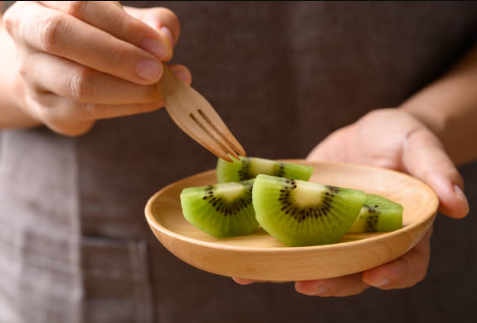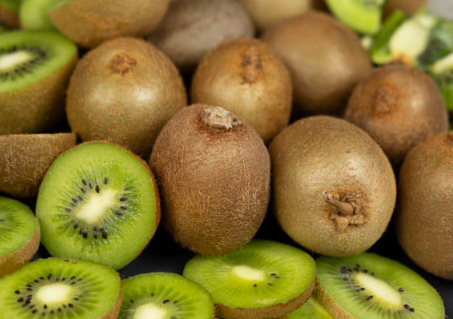🍃 What Is Kiwi?
Though often lumped in with tropical fruits, kiwi (or kiwifruit) actually originates from the grasslands and forests of China and Russia, where it was originally known as the Chinese gooseberry. This vine-grown fruit resembles those found in a vineyard.
The seeds of the species Actinidia deliciosa were first exported to New Zealand in the early 20th century. There, it was rebranded as “kiwi” in honor of the country’s famous flightless bird—and eventually shipped around the globe.
Today, kiwi is one of the most popular “tropical” fruits—often grouped with fruits like mango and pineapple due to its tangy flavor and long growing season, which thrives in warm climates.

🌿 The Benefits of Eating Kiwi
When it comes to nutrition, kiwi packs a serious punch. It’s rich in vitamins C and E, two antioxidants that help reduce inflammation and support immune function.
It’s also loaded with:
-
Vitamin K – for blood clotting and bone health
-
Potassium – for electrolyte balance and heart function
-
Fiber and prebiotics – for gut health and cholesterol support
Fiber helps:
-
Promote digestive regularity
-
Support metabolism
-
Increase satiety (feeling full)
Prebiotics, a form of indigestible fiber, feed the beneficial bacteria in your gut, helping to build a healthier microbiome.
😴 Can Kiwi Really Help You Sleep?
One of kiwi’s more intriguing (and debated) benefits is its potential to improve sleep quality.
Here’s why:
-
Kiwi is a natural source of serotonin, a neurotransmitter that plays a key role in sleep. It can influence:
-
Sleep onset (how fast you fall asleep)
-
Sleep maintenance (staying asleep through the night)
-
Sleep depth
-
-
Serotonin is also a precursor to melatonin, the hormone known for regulating our sleep-wake cycles.
Additionally, kiwi is rich in antioxidants, and some studies suggest antioxidant intake may be linked to better sleep.
🧪 The Research:
A small study found that participants who ate two kiwis one hour before bed every night for four weeks:
-
Fell asleep faster
-
Slept longer
-
Reported better sleep quality overall
While this is a limited study, it offers promising insights into kiwi’s natural sleep-promoting potential.

🥝 How to Eat More Kiwi
Whether you’re curious about its sleep benefits or simply love its tart-sweet flavor and impressive nutrients, there are plenty of delicious ways to enjoy kiwi:
-
Yes, you can eat the skin! It’s completely edible and adds even more fiber, vitamin E, and folate.
-
Add kiwi to:
-
Smoothies
-
Salads
-
Salsas
-
Yogurt bowls
-
Oatmeal
-
Baked goods
-
Homemade sauces
-
Or just scoop and enjoy with a spoon as a simple, nutritious snack.
Whether you’re seeking better sleep or just want to add more vibrant fruit to your diet, kiwi is a versatile, nutrient-dense option worth keeping on hand.